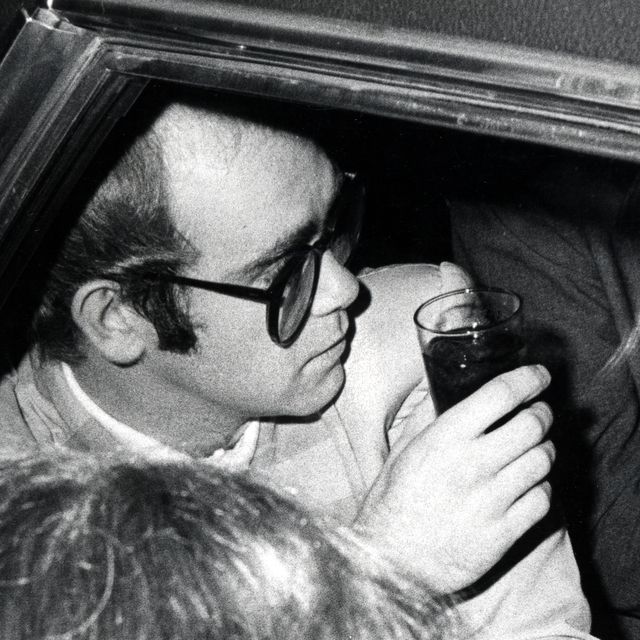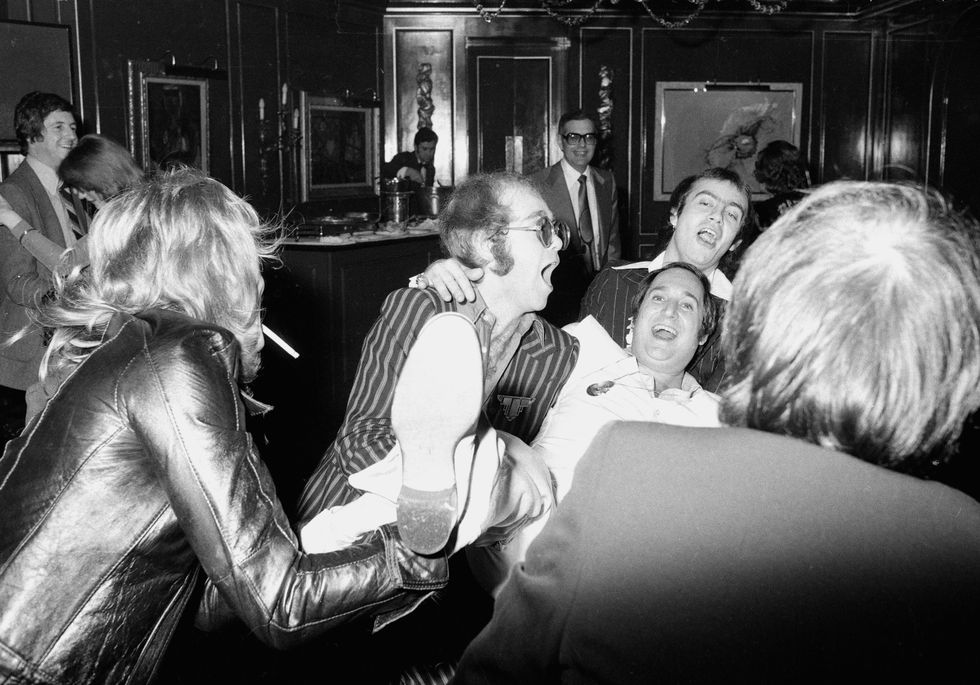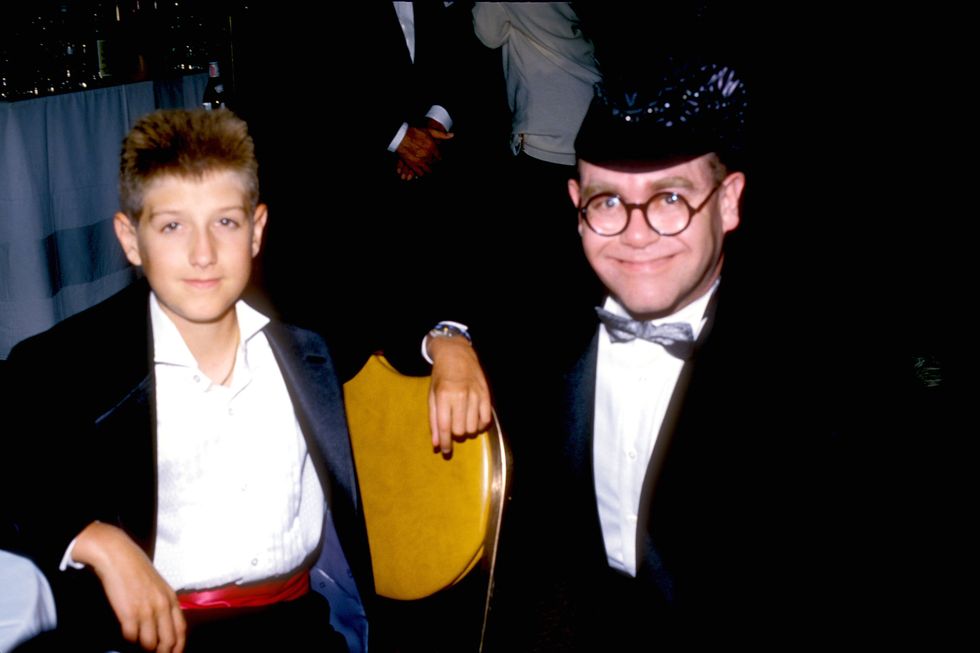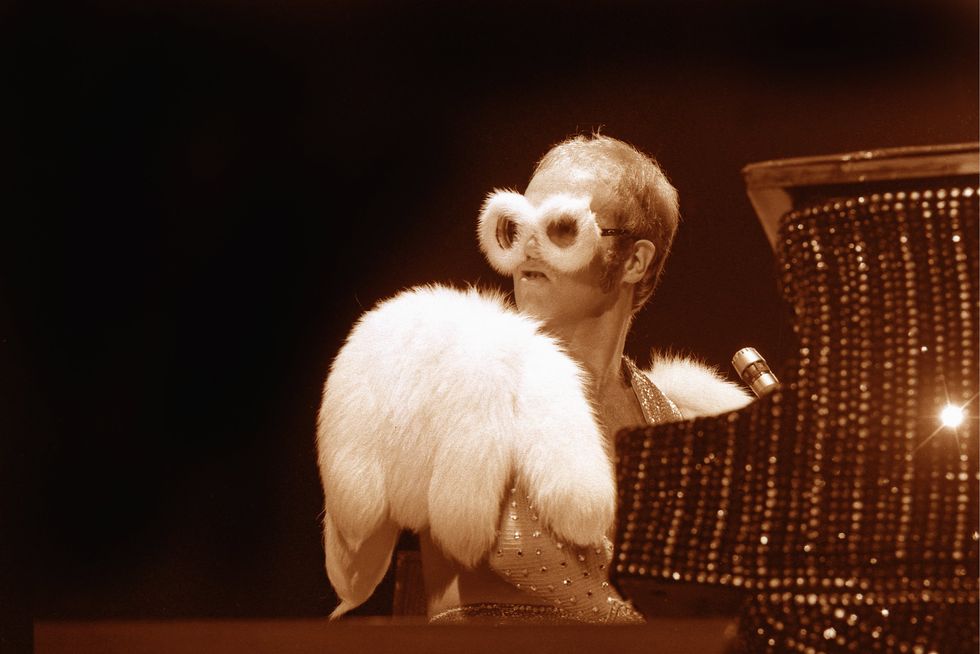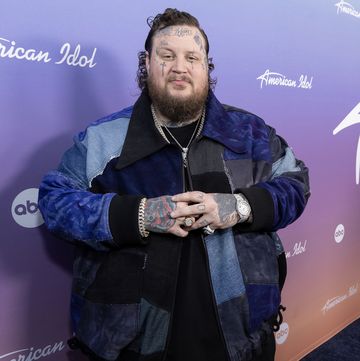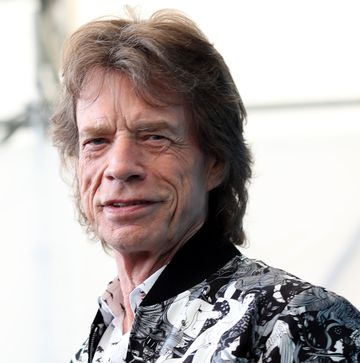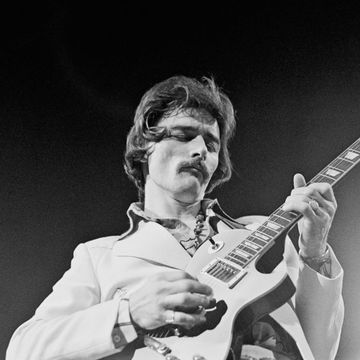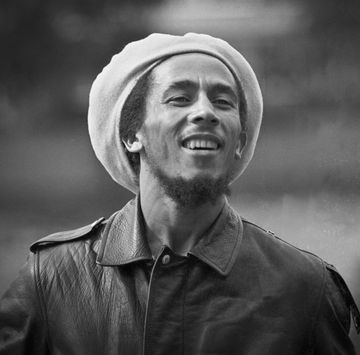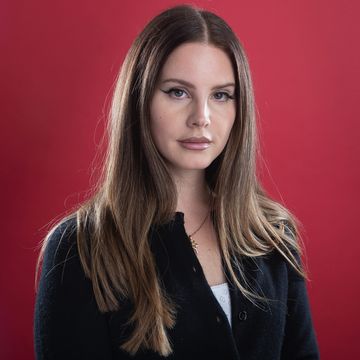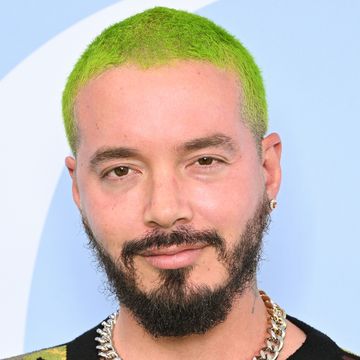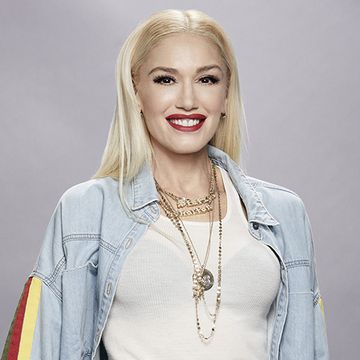Almost three decades clean, Elton John wears his badge of sobriety proudly. He took to Instagram in 2015 to announce the 25th anniversary of his being dry with a picture of a cake topped by the number and the phrase “One day at a time.”
But his past addictions still have a hold on him.
“I still dream, twice a week at least, that I’ve taken cocaine and I have it up my nose,” the performer told NPR in 2012. “And it’s very vivid and it’s very upsetting, but at least it’s a wake-up call.”
John turned to drugs to combat his shyness and substance abuse almost killed him
Onstage in the early 1970s, John was a rock legend, a flamboyant performer who could hold the attention of an entire arena. Offstage he was reserved and says he was shy, so he turned to cocaine in an effort to overcome what he thought he lacked. Over 16 years throughout much of the 1970s and 1980s he experienced life through a drug-fueled haze, and his addiction during the earlier decade will be represented onscreen in the biopic Rocketman, starring Taron Egerton as John and Jamie Bell as his longtime lyricist Bernie Taupin.
But cocaine wasn’t John’s only drug of choice. “This is how bleak it was: I’d stay up, I’d smoke joints, I’d drink a bottle of Johnnie Walker and then I’d stay up for three days and then I’d go to sleep for a day and half, get up, and because I was so hungry, because I hadn’t eaten anything, I’d binge and have like three bacon sandwiches, a pot of ice cream and then I’d throw it up, because I became bulimic and then go and do the whole thing all over again,” John said in a 2010 TV interview with Piers Morgan. “And I’m not being flippant when I say that, when I look back I shudder at the behavior and what I was doing to myself.”
So bleak had his existence become, John admits his substance abuse almost ended his life. “Very close,” he said of how near to death he became. “I mean, I would have an epileptic seizure and turn blue, and people would find me on the floor and put me to bed, and then 40 minutes later I’d be snorting another line.”
Very early in his career, John says he was naïve about drugs and didn’t try cocaine until his manager brought it into the recording studio in the early 70s. In the beginning, he said cocaine was the drug that helped him overcome his shyness. “I always said cocaine was the drug that made me open up. I could talk to people,” he told NPR. “But then it became the drug that closed me down, because the last two weeks of my use of cocaine I spent in a room in London, using it and not coming out … So, it started out by making me talk to everyone and then ended up by me isolating myself alone with it, which is the end of the world, really.”
Out of touch with reality, John recalled to TV host James Corden about the time he telephoned his management office to complain about the weather conditions outside the London hotel he was staying at. “’Robert, it’s far too windy here. Can you do something about it?’” he remembered demanding. “And I can just imagine him putting his hand over the receiver and going, ‘God, he’s finally lost the plot.’”
Meeting AIDS patient Ryan White helped John get sober
During the 1980s the AIDS epidemic surfaced, but growing fear over the then unknown illness failed to curb his drug use. In an interview to publicize his 2012 memoir Love Is the Cure: On Life, Loss and the End of AIDS, John talked about his denial. “You know, I was having people die right, left and center around me, friends. And yet I didn’t stop the life that I had, which is the terrible thing about addiction,” he said. “When you take a drug and you take a drink and you mix those two together, you think you’re invincible. I came out of this HIV-negative. I was the luckiest man in the world.”
The singer credits meeting Ryan White, the American teenage hemophiliac who contracted HIV through a contaminated blood transfusion, with providing the impetus for his start on the path to sobriety. “I had the luck to meet Ryan White and his family,” he said during a Harvard University talk in 2017. “I wanted to help them, but they ended up helping me much more. Ryan was the spark that helped me to recover from my addictions and start the AIDS foundation. Within six months [of White’s death] I became sober, and clean, and have been for 27 years.”
John first became aware of White in 1985. He visited with White and became close with his family, and was at the hospital bedside when the teen died on April 8, 1990. The singer was a pallbearer at White’s funeral and performed “Skyline Pigeon” at the service before 1,500 gathered mourners. White’s legacy was to help change the perception of the disease and to inspire John to create the Elton John AIDS Foundation in 1992, which has raised more than $400 million over the past 25 years to challenge discrimination against people affected by the epidemic, prevent infections, provide treatment and services, and motivate governments to end AIDS.
John tried to help George Michael overcome his addiction
Asking for help, John says, is the hardest part of overcoming your drug problem. “Took me 16 years to say it,” the singer recalled of his addiction in 2018. “I know I’m intelligent, I know I have a problem and I can go six months without it, but it always got worse when I started back on it. … Addiction is a very serious problem and it needs to be addressed by yourself and you need help from people.”
John says he tried to help his late friend George Michael come to terms with his substance abuse, but “you can’t help people who don’t want to help themselves,” he told Britain’s Channel 4 News in 2018. The pair had the 1991 US and UK number one single "Don’t Let the Sun Go Down On Me," but their shared history was not enough to overcome Michael’s resistance to what he saw as John’s meddling in his life.
“When people told me that I was using, that I was doing the wrong thing, I was so angry and I just told them to go away or I actually used stronger language than that,” John said. “So, I understand George, you know when I said a couple of things, and he did a whole page interview in Heat magazine saying I should shut up and I understand what his reaction was.”
Though now sober and dad to two sons with husband David Furnish, John admits he still battles addiction, only not in the form of drugs. After nearly dying when appendicitis was misdiagnosed in 2013, the same year his second child was born, he had to reassess his life choices once again. Only this time it was the nonstop touring and seemingly constant global appearances that had gotten out of hand.
“It was a sign. I’m addicted to working,” he said during an interview with the Guardian. “I’m basically killing myself by traveling so much, for no reason whatsoever. As you know, I can’t have one pair of shoes, I can’t have one CD, I can’t have one bunch of flowers, one car, one ornament, I mean, that’s my mindset. … I always run away with it. The horse bolts, like me with cocaine and everything like that. So, it’s just a wonderful wakeup call.”
